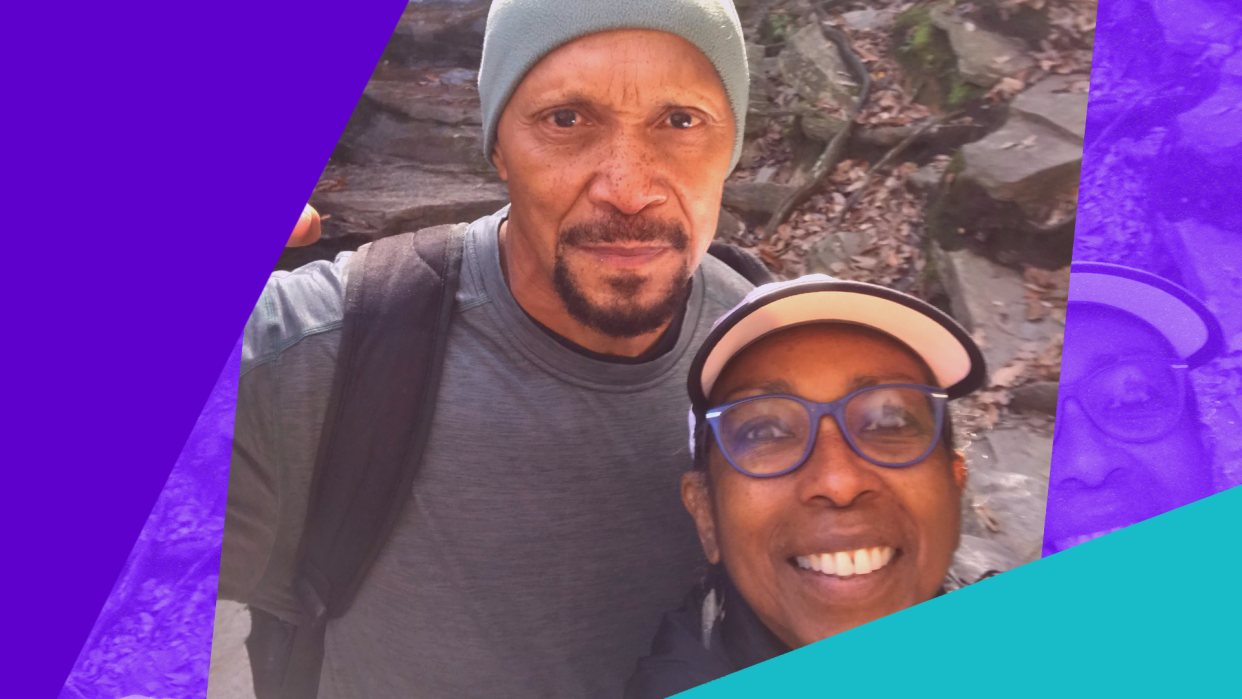She was told she had 12 months to live: one woman's moving battle with cancer

Last year, Paula Adamson went to see her doctor for a routine check-up. But she ended up on a path that led her to being diagnosed with stage 4 lung cancer.
“I did not really have any symptoms,” Adamson, 68, told Yahoo Life. At the time of her check-up in May 2019, she says she had a “slight” cough. “I figured it was just allergies—it was that time of year,” she says. And when Adamson mentioned her cough to her doctor, she was told she likely had exercise-induced asthma. “I work out a lot,” Adamson explains. So, she was prescribed an inhaler.
Adamson noticed she had been losing weight as well, which her doctor chalked it up to her love of exercise. “But the inhaler my doctor gave me made me feel worse,” Adamson says. So, she went back for another evaluation.
The doctor also said that the spot appeared to be cancerous. “At the time, I was thinking, ‘How?’” she recalls. “I don’t even know how to smoke.” Paula Adamson, stage 4 lung cancer patient
Her doctor prescribed her antibiotics and a different inhaler to treat a possible infection and also sent her for an X-ray, just to be on the safe side. It found a spot in her lung.
The scan pushed Adamson further along the path to diagnosis. She’s not alone. Research has found that the likelihood of having a positive lung scan is about twice as high in Black study participants as it is in white study participants.
“I was very concerned,” Adamson says, whose husband died of colon cancer. “The doctor said the spot could be inflammation—she never mentioned cancer at all—but I tried to find out whatever I could about spots in lungs.”
Adamson was referred to a thoracic cardiologist for a scan in June, which detected fluid in her chest. The doctor also said that the spot appeared to be cancerous. “At the time, I was thinking, ‘How?’” she recalls. “I don’t even know how to smoke.”
While lung cancer is often thought of as a smoker’s illness, as many as 20 percent of people in the U.S. who die from the disease have never smoked, according to the American Cancer Society (ACS). Other factors, including exposure to high levels of radon gas, second-hand smoke, air pollution, cancer-causing agents and even genetics can play a role.
Adamson was sent to an oncologist who drained a liter and a half of fluid out of her chest, and placed a drain in her lungs. “I had no idea the fluid was even there,” she says. “They explained to me that your body just makes room for the extra fluid. At some point, I would have had shortness of breath.”
Adamson went through several more tests before she finally got a diagnosis: She had stage 4 non-small cell lung cancer.
“I asked the doctor point-blank what the mortality rate was, and he told me I had 12 to 18 months to live,” Adamson says. “I couldn’t believe it. I’ve taken good care of my body for years. I just kept thinking, ‘How am I going to tell my kids?’ My mind just started racing.”
Adamson is one of many Black Americans with lung cancer.
Cancers of the lung and colorectum are the second and third most commonly diagnosed cancers in Black men and women, according to a report from the ACS. But lung cancer is the most deadly cancer among Black men and women, per ACS data, causing an estimated 9,280 deaths in Black men in 2019 and 7,270 deaths in Black women.
While Black men and women are diagnosed with lung cancer at similar rates to white Americans, there is evidence that African-Americans have a higher baseline risk for developing lung cancer compared to whites. It’s not clear, though, why that’s the case.
However, there is good news: The ACS reports that lung cancer rates for Black men and women are going down. The ACS cites lower smoking rates in Black youth and increased screening as contributing to the decline.
‘I think about it every day’
After her diagnosis, Adamson started taking a daily targeted therapy drug that has shrunken the size of her tumor. “It has not gone away, but it has shrunk,” she says. After 10 months, she was able to have the drain from her lungs removed. “Right now, the medication is smarter than the cancer cells and is blocking the growth of the cells,” she says. “But, at some point, the cancer cells will get smart and will figure out how to get around the pill that I’m taking that’s stopping the progression.”
As for her cancer, Adamson says, “I think about it every day, but I don’t dwell on it.” She says she doesn’t have as much energy as she used to and she struggles to keep weight on, but she’s trying to stay positive with meditation.
Adamson urges other people, and Black women in particular, to be their own advocate. “Doctors don’t know everything about us,” she says. And, if you develop a persistent cough or unexplained weight loss, she recommends pushing for answers. “If one doctor won’t give it to you, go to another,” she says. “Just keep trying.”
Read more:
‘I had lung cancer — and then I got COVID-19’: one woman’s story of survival
What is pancreatic cancer? How to spot early signs of one of the deadliest cancers
5 healthy fall foods you should be eating, according to a registered dietician

